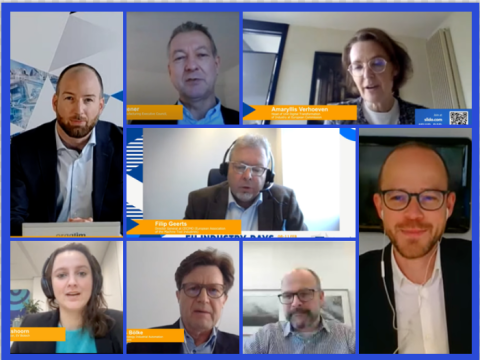EU Industry Days 2022: Accelerating the uptake of advanced manufacturing
10 February 2022

Europe is a world leader when it comes to advanced manufacturing, providing the tools and technologies for other sectors to make the digital and green transition. How do we maintain this leadership and accelerate the uptake of advanced manufacturing technologies in Europe?
This was the focus of yesterday's EU Industry Days session on Advanced Manufacturing, bringing together European industrial leaders at the heart of the global transformation of manufacturing and highlighting the work of Task Force 5 of the Industrial Forum, which Orgalim co-organises together with CECIMO.
A unique opportunity
"Those companies and those economies that master this manufacturing transformation will have a competitive edge during the next decades", stressed Orgalim’s Director General Malte Lohan, opening the session. "We want those future jobs to be created here, we want the future economic prosperity that’s coming from the next generation of manufacturing to be created here. And Europe is uniquely placed to succeed".
Moderated by Orgalim Policy Director Christoph Luykx, panellists shared their insights and experiences from the field on the key opportunities, the enablers and the obstacles ahead.
As Matthias Bölke, Vice President of Industrial Automation at Schneider Electric and Chair of the Executive Forum for Advanced Manufacturing, said: "The technology is here. Our challenge now is not to create, it's really to adopt, and at speed. It is key for the future, and we have a big stake here in Europe".
Amaryllis Verhoeven, Head of DG Grow Unit D3 – Digital Transformation of Industry, European Commission, also joined the session, stressing the importance of the cross-cutting impact of advanced manufacturing and calling on the participants, as users of semiconductors, to continue to engage in the newly unveiled Chips Act.
From a CapEx to an OpEx mindset
Thomas Schneider, Managing Director of Research + Development at TRUMPF, said the main challenge from his perspective is that "we have to change how our customers are buying the technology", because it’s still CapEx driven, as is much of the investment support. "If we switch this into an OpEx driven economy, we as the manufacturer of the equipment take a higher responsibility to make the manufacturing processes at the customers site more successful".
Concluding, CECIMO Director General Filip Geerts emphasised that "to truly unlock the full potential of the Advanced Manufacturing sector it will be essential to provide public and private financial support for manufacturing, both for new ventures and for upgrading existing factories".
He assured that "all the issues discussed today will fuel the work of Task Force 5 on Advanced Manufacturing and help us provide recommendations to keep Europe the leading market for advanced manufacturing technologies".
Orgalim is representing Europe’s technology industries at several sessions at this year’s EU Industry Days. Find out which here and join us for the remaining two days.

LATEST NEWS
How can we create a dynamic, competitive European high-tech manufacturing base?
Orgalim's key recommendations offer policymake...
